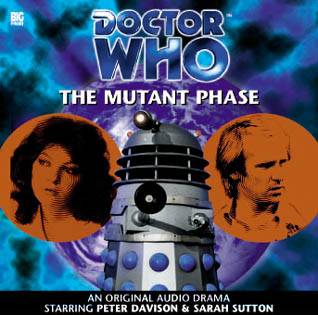|
| |
|
PRODUCTION CODE 6C/C
WRITTEN BY NICHOLAS BRIGGS
DIRECTED BY NICHOLAS BRIGGS
RECOMMENDED PURCHASE BIG FINISH CD#15 (ISBN 1-903654-21-1) RELEASED IN DECEMBER 2000.
BLURB IN THE 22ND CENTURY, the Daleks have occupied planet Earth. By the 43rd century, only a handful of humans survive. Still further into the distant future, a Thal scientist must choose whether to betray his heritage, or see the universe destroyed.
When the Doctor and Nyssa find themselves trapped in this deadly chain of events, they must decide who their real enemies are. What is certain, however, is that no matter where the Doctor turns. . . his arch enemies, the Daleks, will be waiting for him.
What could possibly be worse than that? The Mutant Phase... |
|
|
The Mutant Phase december 2000 (4 EPISODES)
Save for on the printed page, The Mutant Phase is about as close as one man can get to forging a Doctor Who story that’s all his own. Not only did Nicholas Briggs write the script for these four episodes, but he directed each of them too, and even hired himself to voice most of the remodulated antagonists. As a result this story has the unyielding vision of a novel, buoyed the vitality of a full cast, not to mention all the dynamic aural effects that are synonymous with a Big Finish audio production.
Despite being tagged with the same Dalek Empire subtitle as its fellow Big Finish Dalek releases, The Mutant Phase casts its net far wider than its peers. Indeed, having begun life as a fan production many years ago, this story is unabashed ‘fan fiction’ – and I don’t use the term pejoratively. Briggs takes the time paradox of Day of the Daleks, but riffs upon it in the far more interesting setting of the established Dalek occupation of Earth in the late 2150s. He borrows the booming Emperor Dalek from The Evil of the Daleks, but casts him in an edifying new light. Most impressively of all though, Briggs’ eponymous mutant phrase succeeds where Movellans and Mechanoids failed as it takes the idea of an unconquerable Dalek nemesis and makes it credible. The very idea that the Daleks could evolve into something even more destructive is a terrifying proposition, particularly when Briggs explores the Daleks’ fear of it, and the fear that provokes in others – the Doctor amongst them.
What sets The Mutant Phase apart from fan fiction is its finesse. Briggs’ plot is incredibly clever, if a little maddening at times, and certain developments reek as much of Wells’ War of the Worlds as they do Whitaker’s war on Skaro - the whole story pivots on the parts played by genetically modified crops, a hole in a Dalek’s casing and a wasp’s sting.
I was also quite taken with the production’s daunting scope, which encompasses a dead planet Earth in the far future that’s been ravaged by the mutant phase; the Dalek-occupied United States of the 2150s (Mark Gatiss’s redneck Roboman is certainly something to be heard); and even the Emperor Dalek’s throne room on Skaro.
For me, though, this story’s greatest strength is its characterisation. The two Thal scientists, Ptolem and Ganatus, remain fascinatingly inscrutable characters for most of the narrative, and the survivors of the mutant phase-ravaged Earth are almost as opaque – albeit far wackier. It is Peter Davison’s Doctor who steals the show though – this script highlights the incarnation’s greatest strengths and fatal flaws, juxtaposing his ubiquitously razor-sharp mind and gentlemanly valour with agonising moments of impotence. The second episode’s cliffhanger is rendered almost beautiful in its horror thanks to the Doctor’s acute helplessness.
The Mutant Phase
is without a doubt the strongest Big Finish Dalek story to date. It may
lack the freshness of The Genocide Machine, but it boasts all the
epic grandeur of The Apocalypse Element - and without rupturing
your ear drums too.
|
|
|
Copyright © E.G. Wolverson 2006
E.G. Wolverson has asserted his right under the Copyright, Designs and Patents Act, 1988 to be identified as the author of this work. |
|
|
Unless otherwise stated, all images on this site are copyrighted to the BBC and are used solely for promotional purposes. ‘Doctor Who’ is copyright © by the BBC. No copyright infringement is intended. |
|

.jpg)
